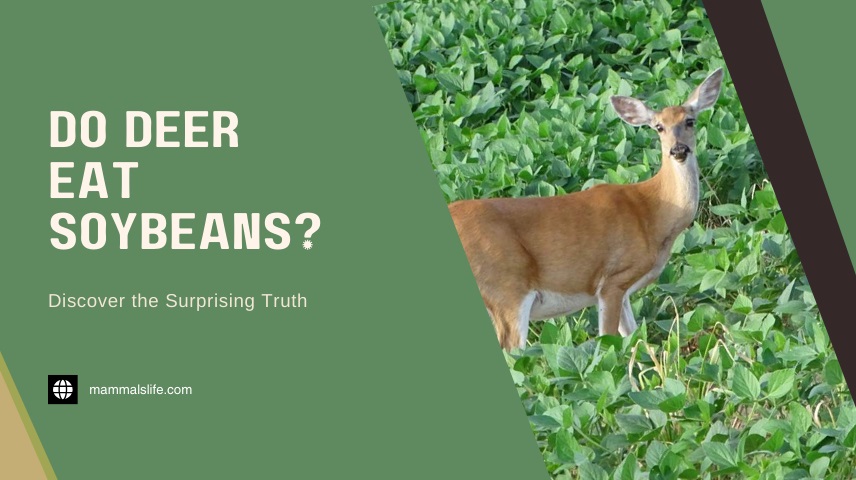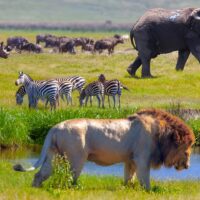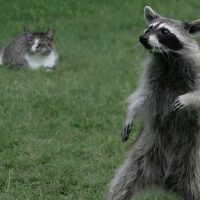Last Updated on February 22, 2025 by Mammals Life
Yes, deer eat soybeans. They find soybeans highly nutritious and often forage on them during the growing season.
Deer are herbivores and have a diverse diet that includes a variety of plants, fruits, and nuts. Soybeans rank high on their list of preferred foods due to their rich nutritional content. Farmers often notice significant deer activity in soybean fields, especially during early growth stages.
This can impact crop yields and lead to economic losses. Understanding deer feeding habits can help farmers implement effective management strategies. Planting deer-resistant crops or using deterrents can minimize damage. Proper planning and wildlife management can create a balance, ensuring both agricultural productivity and the well-being of local deer populations.
Deer’s Natural Diet
Deer are herbivores and have a varied diet. They consume a range of plants, leaves, and other vegetation. Understanding their natural diet helps us know what they eat in different seasons.
Common Foods
- Grasses: Deer often graze on grasses, especially in open areas.
- Fruits: They enjoy fruits like apples, berries, and persimmons.
- Leaves: Leaves from trees and shrubs are a significant part of their diet.
- Nuts: Acorns, chestnuts, and other nuts provide essential nutrients.
- Soybeans: Deer do eat soybeans, particularly in agricultural areas.
Seasonal Variations
| Season | Food Sources |
|---|---|
| Spring | Fresh grasses, new leaves, and early fruits. |
| Summer | Abundant fruits, lush grasses, and leafy plants. |
| Fall | Acorns, nuts, harvested crops like soybeans. |
| Winter | Bark, twigs, and evergreen leaves. |
Deer adapt their diet based on food availability. This helps them survive through different seasons.
Soybeans As A Food Source
Soybeans are a popular crop for farmers. Deer find soybeans delicious. They often snack on soybean plants. Soybeans are rich in nutrients and beneficial for deer.
Nutritional Value
Soybeans provide excellent nutrition for deer. They are packed with proteins, vitamins, and minerals. Here’s a table summarizing the nutritional value of soybeans:
| Nutrient | Amount per 100g |
|---|---|
| Protein | 36.5g |
| Fat | 19.9g |
| Carbohydrates | 30.2g |
| Fiber | 9.3g |
| Vitamins | A, B6, C |
| Minerals | Iron, Magnesium, Calcium |
These nutrients help deer grow strong and healthy. Soybeans are especially good for deer in winter. They provide energy and keep deer warm.
Agricultural Impact
Deer eating soybeans affects farmers. Deer can damage soybean fields. This can reduce crop yields. Farmers take steps to protect their crops. Some use fences or scare tactics. Others plant soybeans away from forest edges.
Here are some ways farmers manage deer:
- Using electric fences
- Applying deer repellents
- Planting alternative food plots for deer
- Rotating crops to confuse deer
Managing deer is important for farmers. It helps ensure a good soybean harvest. Balanced wildlife management benefits both deer and farmers.
Deer Behavior Around Soybeans
Deer are fascinating creatures with specific feeding habits. They love soybeans. Understanding their behavior can help manage crops effectively. Let’s explore their feeding patterns and what attracts them to soybeans.
Feeding Patterns
Deer are most active during dawn and dusk. They prefer feeding in low light. This makes them crepuscular feeders. They will visit soybean fields several times a day. Deer love tender soybean plants. They eat leaves, stems, and pods.
Here is a simple table showing deer feeding times:
| Time of Day | Deer Activity |
|---|---|
| Early Morning | High |
| Late Afternoon | High |
| Midday | Low |
Attraction Factors
Several factors draw deer to soybean fields. Soybeans are rich in proteins. This makes them a favorite food source.
- Nutrient-rich: Soybeans offer essential nutrients.
- Accessibility: Fields are easy for deer to access.
- Soft Texture: Young soybean plants are tender and easy to eat.
Deer have a strong sense of smell. They can detect soybeans from a distance. This sense helps them locate food quickly.
Understanding these behaviors can help protect crops. Farmers can use fences and repellents to manage deer. This knowledge is valuable for both farmers and wildlife enthusiasts.
Impact On Soybean Crops
Deer are known to feast on a variety of crops, including soybeans. This can have a significant impact on soybean crops, leading to various challenges for farmers. Understanding these impacts can help in devising effective strategies to mitigate the damage.
Crop Damage
Deer can cause serious crop damage to soybean fields. They often consume the young soybean plants, which can stunt growth or kill the plant entirely. This damage is most severe during the early growth stages. Mature plants can also be affected, as deer nibble on leaves and pods, reducing overall yield.
| Stage of Growth | Type of Damage |
|---|---|
| Early Growth | Plants eaten, stunted growth |
| Mature Plants | Leaves and pods nibbled |
Economic Consequences
The economic consequences of deer damage to soybean crops can be significant. Reduced yields directly affect the farmer’s income. The cost of implementing protective measures also adds to the financial burden. Farmers may need to invest in fencing, repellents, and other deterrents to protect their crops.
- Reduced yields
- Increased costs for protection
- Potential loss of market opportunities
These economic impacts highlight the need for effective deer management strategies in soybean farming. By understanding the extent of the damage and its financial implications, farmers can better protect their crops and livelihoods.
Managing Deer In Soybean Fields
Managing deer in soybean fields is crucial for protecting crop yields. Deer can cause significant damage to young soybeans. Implementing effective strategies can help mitigate these losses. Below are some ways to manage deer in soybean fields.
Preventive Measures
Implementing preventive measures can help deter deer from entering soybean fields.
- Fencing: Install tall fences around the field. This can effectively keep deer out.
- Repellents: Use deer repellents around the perimeter. These can be chemical or organic.
- Noise Makers: Install noise-making devices. Sudden loud noises can scare deer away.
Control Strategies
Control strategies are essential to manage deer populations within soybean fields.
- Hunting: Regulated hunting during the season can reduce deer numbers.
- Trapping: Use humane traps to capture and relocate deer.
- Birth Control: Apply birth control measures to reduce reproduction rates.
Using a combination of these methods can effectively manage deer in soybean fields. This will ensure healthier crops and better yields.
Alternative Deer Deterrents
Deer often find soybean fields irresistible. Farmers need effective deterrents. Alternative methods can help keep deer away from soybeans.
Natural Repellents
Natural repellents can be a great way to deter deer. They are eco-friendly and easy to apply.
- Garlic Spray: Deer dislike the smell of garlic. Mix garlic with water and spray on plants.
- Soap Bars: Hang soap bars around the field. Deer avoid the strong scent.
- Hot Pepper Spray: This irritates the deer’s mouth. Mix hot peppers with water and spray.
Technological Solutions
Technology can also help keep deer away. There are several modern devices available.
| Device | Description |
|---|---|
| Motion-Activated Sprinklers | These spray water when they detect movement. Deer get scared away. |
| Ultrasonic Devices | They emit high-frequency sounds. Deer find the noise disturbing and leave. |
| Electric Fences | These give a small shock. Deer learn to stay away quickly. |
Frequently Asked Questions
Do Deer Eat Soybeans In Fields?
Yes, deer are known to eat soybeans in fields. They enjoy the nutritious leaves and pods.
Can Soybeans Be Harmful To Deer?
No, soybeans are not harmful to deer. They provide essential nutrients and are a good food source.
How To Prevent Deer From Eating Soybeans?
Use fencing, repellents, or scare devices to prevent deer from eating soybeans. These methods can be effective.
When Do Deer Eat Soybeans The Most?
Deer eat soybeans the most during the growing season. They are attracted to the tender leaves and pods.
Conclusion
Understanding deer dietary habits is essential for managing your crops. Deer do eat soybeans, especially during certain seasons. Protecting your fields with proper fencing and deterrents can help. By knowing their preferences, you can better safeguard your harvest. Stay vigilant and adapt your strategies to keep your soybeans safe.








